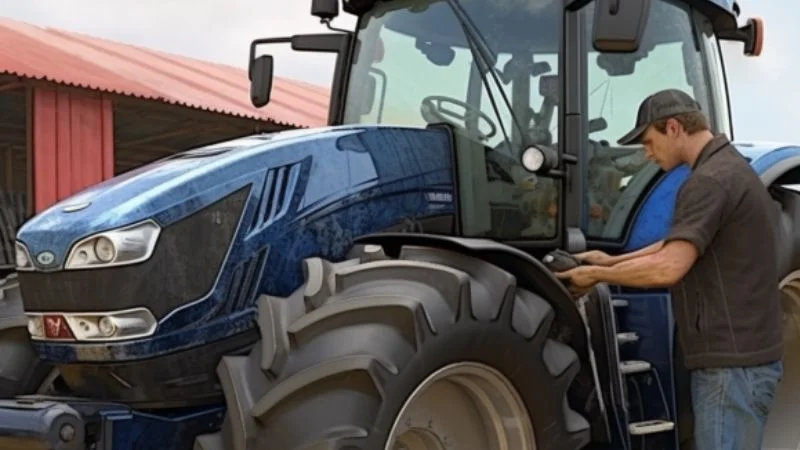Should You Fill Tractor Tires with Water? Weighing the Pros and Cons for Optimal Farming Performance

Filling tractor tires with water is a common practice among farmers. It is done to increase the weight of the tractor and improve traction on wet or uneven ground. However, like any other farming practice, it has its advantages and disadvantages.
In this article, we will explore the pros and cons of filling tractor tires with water. We will weigh the benefits against the potential drawbacks to help you make an informed decision about whether or not this practice is right for your farming operation.
The Debate Surrounding Water-Filled Tractor Tires
The practice of filling tractor tires with water has sparked a lively debate within the agricultural community, with proponents and detractors presenting contrasting views on its efficacy. Proponents argue that water-filled tires offer significant advantages, particularly in terms of traction and stability.
By adding water to the tires, the weight increases, which can improve traction in challenging field conditions such as muddy or sloping terrains. This enhanced traction allows tractors to navigate difficult surfaces with greater ease and reduces the risk of slippage, ultimately enhancing overall stability during operations.
Additionally, water-filled tires are believed to distribute weight more evenly, providing improved load-bearing capacity and minimizing soil compaction, which can be particularly beneficial for farms that prioritize soil health and long-term sustainability.
On the other hand, detractors raise valid concerns about the potential drawbacks of filling tractor tires with water. One of the main points of contention is the increased vulnerability to tire damage and punctures. Water-filled tires are more prone to punctures from sharp objects, which can lead to leaks and require costly repairs.
Moreover, extreme temperature fluctuations can cause the water inside the tires to freeze or expand, potentially resulting in structural damage to the tires themselves. This concern is particularly relevant in regions with harsh winters or unpredictable climate patterns. Another consideration is the potential negative impact on maneuverability.
The additional weight from water-filled tires may affect the tractor’s agility and maneuvering capabilities, especially in tight spaces or when performing delicate operations. This could lead to reduced efficiency and potential strain on other components of the machinery.
The Pros of Filling Tractor Tires with Water
Filling tractor tires with water offers potential benefits such as enhanced traction and stability, improved load-bearing capacity, reduced soil compaction, and potential fuel efficiency gains. Water-filled tires provide increased traction, allowing tractors to navigate challenging terrains with ease and reducing slippage.
The added weight distributes the load more evenly, minimizing soil compaction and promoting soil health. Furthermore, proponents suggest that water-filled tires can contribute to fuel efficiency by reducing wheel slippage during field operations.
Enhanced Traction and Stability
Filling tractor tires with water can provide enhanced traction and stability, which are crucial factors in optimizing farming performance. The additional weight from the water increases the tire’s grip on the ground, improving traction and reducing the chances of slippage, especially in challenging field conditions such as muddy or sloping terrains.
This increased traction enables tractors to maintain stability and maneuverability, allowing farmers to navigate through difficult surfaces more effectively. By enhancing traction and stability, water-filled tires can contribute to smoother and more efficient farming operations, ultimately leading to improved productivity and reduced risks of accidents or equipment damage.
Improved Load-Bearing Capacity and Reduced Soil Compaction
Filling tractor tires with water can result in improved load-bearing capacity and reduced soil compaction, offering benefits for optimal farming performance. When tractor tires are filled with water, the weight distribution becomes more even, allowing for better load-bearing capabilities. This can be advantageous when carrying heavy loads or operating on soft or loose soil.
The increased weight helps distribute the load more evenly across the tire surface, reducing the pressure exerted on the soil and minimizing soil compaction. By reducing soil compaction, water-filled tires help maintain the soil’s structure and porosity, promoting healthy root growth and nutrient absorption by the crops. Furthermore, reduced soil compaction can enhance water infiltration and drainage, leading to improved soil aeration and overall soil health.
Potential Fuel Efficiency Benefits
Filling tractor tires with water has the potential to offer fuel efficiency benefits, which can positively impact farming operations. By adding water to the tires, the increased weight helps to reduce wheel slippage during field operations. When tires slip, it not only wastes energy but also decreases overall efficiency. With water-filled tires providing better traction, there is a reduced likelihood of slippage, leading to improved energy utilization and potentially lower fuel consumption.
The enhanced grip and stability of water-filled tires can allow tractors to operate more efficiently, especially in challenging terrains or when performing tasks that require substantial power. By maximizing traction and minimizing slippage, farmers may experience notable fuel efficiency gains, leading to cost savings and a more sustainable approach to farming operations.
The Cons of Filling Tractor Tires with Water
Filling tractor tires with water also comes with potential drawbacks. One major concern is the increased vulnerability to tire damage and punctures. Water-filled tires are more susceptible to punctures from sharp objects, leading to leaks and the need for costly repairs. Additionally, extreme temperature fluctuations can cause the water inside the tires to freeze or expand, potentially causing structural damage to the tires themselves.
The added weight of water-filled tires can also impact maneuverability, potentially reducing agility and making it more challenging to navigate in tight spaces or perform delicate operations. These factors should be carefully considered before deciding to fill tractor tires with water, weighing the potential drawbacks against the desired benefits in specific farming conditions.
Tire Damage and Increased Vulnerability to Punctures
One significant concern when filling tractor tires with water is the increased vulnerability to tire damage and punctures. Water-filled tires are more prone to punctures from sharp objects compared to conventional air-filled tires. This heightened vulnerability can lead to leaks, loss of tire pressure, and potential downtime for repairs or replacements.
Farming operations often involve rough terrains with various debris, such as rocks, thorns, or metal objects, which can pose a greater risk of puncturing water-filled tires. It is essential for farmers to carefully assess the potential hazards in their specific farming environments and consider the impact of tire damage and punctures on productivity and overall costs before opting for water-filled tires.
Implementing preventive measures, such as tire sealants or selecting appropriate tire types, can help mitigate the risk of tire damage and minimize downtime.
Potential Negative Impact on Maneuverability
Filling tractor tires with water can potentially have a negative impact on maneuverability, which is an important consideration for farmers. The additional weight from the water can affect the tractor’s agility and maneuvering capabilities, particularly in situations that require tight turns or precise movements. The increased weight can make it more challenging to navigate through narrow spaces or perform tasks that demand quick and precise maneuvering.
This reduced maneuverability can impact overall efficiency and productivity during farming operations. Farmers should carefully evaluate the specific requirements of their operations, considering factors such as the size of their fields, the need for tight maneuvering, and the trade-off between enhanced traction and potential limitations in maneuverability when deciding whether to fill their tractor tires with water.
Challenges with Temperature Fluctuations
Challenges with temperature fluctuations are another consideration when it comes to filling tractor tires with water. Extreme temperature changes can pose risks and complications for water-filled tires. During freezing temperatures, the water inside the tires can freeze and expand, potentially causing structural damage to the tires.
This can lead to tire deformations, leaks, or even tire bursts. Similarly, in hot weather conditions, the water inside the tires can expand, potentially increasing the internal pressure and putting additional stress on the tire structure. These temperature-related challenges can compromise the integrity and longevity of water-filled tires, requiring more frequent inspections, maintenance, and potential replacements.
Farmers operating in regions with significant temperature variations should carefully assess the potential impact of temperature fluctuations on water-filled tires and consider alternative options or additional measures to mitigate these risks.
Factors to Consider Before Making a Decision
Before making a decision on whether to fill tractor tires with water, there are several key factors to consider. Firstly, assessing the specific soil conditions and terrain of the farm is crucial, as water-filled tires may have varying effects depending on the ground’s characteristics.
Secondly, considering the climate and temperature fluctuations in the region is important, as extreme temperatures can pose challenges for water-filled tires.
Additionally, evaluating the impact on maneuverability, potential risks of tire damage and punctures, and the overall requirements of the farming operations are essential.
Soil Conditions and Terrain
Soil conditions and terrain are vital factors to consider when deciding whether to fill tractor tires with water. Different types of soil, such as sandy or clay-based soils, may react differently to water-filled tires, affecting traction and compaction. Evaluating the terrain, including factors like slopes, uneven surfaces, or wet areas, is crucial to understand how water-filled tires would perform in such conditions.
Additionally, considering the specific farming operations, such as plowing, harvesting, or hauling, and how water-filled tires may impact productivity and efficiency in different soil and terrain types is essential for making an informed decision.
Climate and Temperature Variations
Climate and temperature variations play a significant role in the decision of filling tractor tires with water. It is essential to consider the climate patterns and temperature fluctuations in the region where the farming operations take place. Extreme temperature changes, such as freezing winters or scorching summers, can pose challenges for water-filled tires. Freezing temperatures can cause the water inside the tires to freeze and expand, potentially leading to tire damage.
Similarly, high temperatures can cause the water to expand, increasing internal pressure and potentially compromising tire integrity. Farmers operating in regions with significant temperature variations should carefully evaluate the potential impact on water-filled tires and consider alternative options or additional measures to mitigate the risks associated with temperature fluctuations.
Machinery Performance and Maintenance
Machinery performance and maintenance are crucial considerations when deciding whether to fill tractor tires with water. The added weight of water-filled tires can potentially affect the overall performance of the tractor. It is important to assess whether the machinery is designed to handle the increased weight and if it can maintain the desired level of efficiency and productivity with water-filled tires.
Additionally, regular maintenance and inspections become essential to ensure the proper functioning of water-filled tires. Monitoring for any signs of tire damage, leaks, or irregularities becomes crucial, as maintenance requirements may differ compared to traditional air-filled tires.
Adequate maintenance practices, such as proper tire pressure management and timely repairs, should be implemented to optimize the performance and longevity of water-filled tires. Farmers should evaluate the compatibility of their machinery with water-filled tires and be prepared to incorporate appropriate maintenance protocols to ensure optimal performance.
Making an Informed Decision: Evaluating Your Farming Operations
Making an informed decision about whether to fill tractor tires with water requires a thorough evaluation of your farming operations. Start by assessing the specific needs and demands of your farm. Consider factors such as the types of crops cultivated, the terrain and soil conditions, and the specific tasks performed with your tractor. Evaluate how filling the tires with water may impact traction, stability, and overall productivity in your unique farming environment.
Next, analyze the potential benefits and drawbacks discussed earlier in this article. Consider the advantages of enhanced traction, improved load-bearing capacity, and potential fuel efficiency gains against the potential disadvantages of tire damage, decreased maneuverability, and challenges with temperature fluctuations. Weigh the pros and cons in relation to your specific farming requirements and priorities.
Additionally, seek advice from experts in the agricultural industry, such as tire specialists, equipment manufacturers, or experienced farmers who have utilized water-filled tires. They can provide valuable insights based on their knowledge and practical experience, helping you make a more informed decision.

